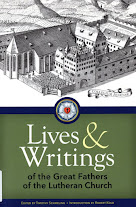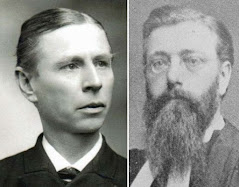1: Of the Holy Scriptures 11
2: Of the Church 17
3: Of Justification 33
5: Of the Sacraments 58
6: Of the Holy Supper 63
9: Of the Mass 74
12: Of Purgatory 102
13: Of Celibacy or Priestly Marriage 116

Back To Luther... and the old (German) Missouri Synod. Below are thoughts, confessions, quotations from a Missouri Synod Lutheran (born 1952) who came back to his old faith... and found more treasures than he knew existed in the training of his youth. The great Lutheran lineage above: Martin Luther, C.F.W. Walther, Franz Pieper.
Search This Blog
Thursday, February 8, 2024
Hoe2: Evangelical Handbook, now in English (Another BTL book); no change in Rome
Monday, February 5, 2024
Walther on Hoe von Hoenegg's little book: polemic converts Jesuit; a 200-year favorite (Part 1 of 9)
C. F. W. Walther was always ready to promote good Lutheran books to his people. And so his emphatic recommendation of the following book, by an author unknown to me and with a somewhat odd name, caught my eye, and oh! I had to dig deeper into the story of the author, the book itself, and the great effect it had for Lutheranism in his day when the Reformation was undergoing great stress from the Roman Catholic Church in the 1600s, also in the 1700s. (Although I have already posted a blog 2 years ago on a portion of this, I am now publishing the full text.)
in which it is irrefutably proven from several passages of Holy Scripture how the so-called Lutheran faith is truly catholic, but the papal doctrine is fundamentally erroneous and contrary to the bright Word of God. By Matthias Hoe von Hoenegg [Wikipedia, ADB, PRDL]. Dresden by Heinrich Naumann. 1870.
The author of this little book, born in Vienna, died as chief court preacher in Dresden in 1645, was a theologian who was as learned as he was godly and spiritual. Proof of this is his Evangelical Handbook. It is undoubtedly the most thorough and beautiful of the short writings on the refutation of papism that are comprehensible to everyone. While it proves everything irrefutably from God's Word, it also gives the most convincing evidence for this from the Church Fathers, not only in Latin, but also always in German translation. The booklet has the particular advantage that it is written with great enthusiasm for the faith, not in a stiff, scholarly style, but in a highly lively, popular style. Since 1603, when it was first published, it has been a favorite book of the people in Germany for two hundred years and has therefore often been reprinted. For a long time, the papists did not dare to attempt a refutation of this little book, which was so unassailably entrenched in God's Word.
Finally, the famous Jesuit Dr. Jakob Reihing set about against it and wrote his [Catholic] Handbook. But what happened? When this Jesuit was urged to refute the scriptural evidence given in the handbook [of Hoe] and to substantiate his own assertions with Scripture, the light finally dawned on him by the grace of God, he converted, became a Lutheran, revoked his own supposed refutation of the Handbook [see his explicit retraction on p. 17] and showed of himself what fallacies he had made. In 1628 he finally died as a Lutheran professor and superintendent in Tübingen, blessed and calm in his faith in his one Mediator. So, dear reader, if you want an armor for yourself against the papacy that always has victorious weapons against it – you have them in the "Handbook".
It is a booklet of 157 pages, and is to be had from our agent, Mr. M. C. Barthel, Corner of 7th & Lafayette Streets, St. Louis, Mo. well bound for 60 Cts. It would be very desirable that this delightful little book should be translated into English, and thus made accessible to Lutherans who only understand English. W. [Walther]
Saturday, February 3, 2024
Pieper to Sieker 2: "annoying lack of money!"
The annoying lack of money! But we Missourian Lutherans are foolish people. Why don't we put an end to the lack of money? We are a great body by God's grace. If we encouraged each other to give regularly, there would soon be an abundance of money. I strongly emphasize regular, consistent giving. This is nothing legalistic [Gesetzliches]. One thing remains certain: everyone, according to what he has and is willing through God's grace. But such free, regular giving has the apostolic example in its favor. 1 Cor. 16:2: "On every Sabbath day every one of you lays aside for himself and gather together what seemeth him good." It is strange that the Holy Spirit allowed this to come into the Holy Scriptures. He knew well that the gifts get stuck in very many cases when large gifts are only to be given every now and then, perhaps only once or twice a year. Therefore he admonishes: "On every Sabbath... what seemeth him good." This regular giving is also much more appropriate to the spiritual life. We regularly receive grace upon grace from Christ, not just once or twice a year. What is more natural than that we also give and share regularly.
How little is given generally and regularly in our synod is evident from the fact that, if all contributions for extra-parish purposes are added up and divided among the number of those entitled to communion, each member accounts for about 60 to 70 cents a year, and this is a continual hustle! If we generally became accustomed to regular giving according to the apostolic model, not only would we collect much more for all purposes in the Kingdom of God, but we would also not be under the impression that we had exerted ourselves to the utmost. How easy it should be, for example, to raise about $40,000 for the immigrant house! One Sunday collection by the entire synod would produce the necessary sum.
But excuse me; against my will, I hastily went into more detail. But the matter has been close to my heart for years. I am so very sorry that due to lack of resources we have to refrain from doing so much that obviously should be done. And yet we have the abundant and superabundant means. If only we acted according to 1 Corinthians 16!
With kind regards,
Yours united in Christ
F. Pieper.
Thursday, February 1, 2024
Pieper letter to Sieker, NYC: on education, money (Part 1 of 2)
 |
| St. Matthews, NYC (c. 1880s) Broome & Elizabeth Sts. (formerly First Baptist) |
A letter from Dr. Pieper to Pastor J. H. Sieker in New York.
The letter, written forty-five years ago, was sent to us by the recipient's son, Fr. [Friedrich?] Otto Sieker.
St. Louis, Mo., January 20, 1886.
Dear Pastor!
I have just read the last issue of the [Lutheran] Witness and I feel compelled to write a few words to you. They should be words of encouragement. I am very sorry that the Progymnasium ["pre-high school"] in New York still receives so little attention on the part of our Eastern District; but don't lose heart because of this. It seems that the importance of such an institution has not yet been recognized in New York. This knowledge must and will come through God's grace, and then more, indeed all hands will take hold. I hope to God that there will be a full high school in New York soon.
.jpg) |
| Concordia College, Bronxville (earlier years, now closed) |


.jpg)

.jpg)


